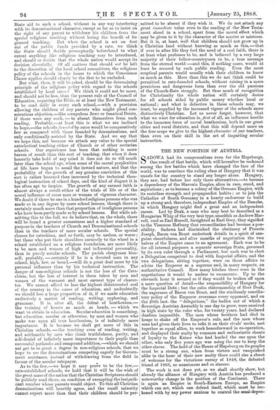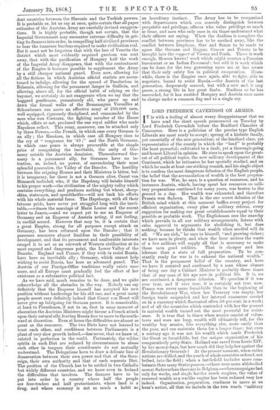THE NEW POSITION OF AUSTRIA.
QADOWA had its compensations even for the Hapsburgs- k..) One result of that battle, which will hereafter be reckoned among the few battles which have changed the face of the world, was to convince the ruling class of Hungary that it was unsafe for the country to stand any longer alone. Hungary, they saw, had before her only three alternatives,—to become- a dependency of the Slavonic Empire, alien in race, creed, and aspirations ; or to become a colony of the German Empire, with its resistless strength and propagandist habits ; or to join the Catholics of South Germany in a hearty endeavour to build up a strong and, therefore, independent Empire of the Danube, in which Hungary might find a great and an independent career. Led by Deak, a man who may best be described as a Hungarian Whig of the very best type, unselfish as Andrew Mar- vell, cool as Earl Russell, farsighted as Earl Grey, they signified to the Viennese Hofburg that reconciliation had become a pos- sibility. Sadowa had diminished the obstinacy of Francis. Joseph, Baron von Beast undertook details in a spirit of san- guine cheerfulness, and after months of negotiation the two halves of the Empire came to an agreement. Each was to be- for all internal purposes a separate sovereign State, governed by its own ruler through a Parliament, but each was to elect a Delegation competent to deal with Imperial affairs, and the- two delegations, sitting together, were on those affairs to- advise the Emperor as a supreme and, in many respects, an authoritative Council. How many hitches there were in the- negotiations it would be useless to enumerate. Up to the eleventh hour it seemed as if they would be broken off upon a mere question of detail—the responsibility of Hungary for- the Imperial Debt ; but the calm statesmanship of Herr Deak, the eagerness of Baron von Beast, and the studiously concilia- tory policy of the Emperor overcame every opponent, and on the 20th inst. the "delegations," the bodies out of which a. Sovereign Austrian Assembly is one day to grow, were received in high state by the ruler who, for twenty years, had declared dualism impossible. The men whose brothers had died in heaps to shake off the Emperor's rule, and the men whose sons had given their lives to refix it on their rivals' necks, met together as equal allies, to work henceforward in co-operation, and displayed their amity by common and enthusiastic shouts of loyalty to the Kaiser who had hurled the one upon the other, -who only five years ago was using the one to keep the other slaves. The hold of the House of Hapsburg on its peoples must be a strong one, when from victors and vanquished. alike in the hour of their new amity there could rise a shout of welcome for the victorious enemy of 1848, the defeated friend of 1866, so unanimous and so sincere.
The work is not done yet, as we shall shortly show, but already the alliance of Hungary with Austria has produced a noteworthy change in the position of the Continent. There is again an Empire in South-Eastern Europe, an Empire which can act, which can defend itself, which must be rec- koned with by any power anxious to control the sevaii-clepen-
dent countries between the Slavonic and the Turkish powers. It is probable or, let us say at once, quite certain that all paper estimates of the Austrian Army are carefully devised exaggera-
tions. It is highly probable, though not certain, that the Imperial Government may encounter extreme difficulty in get-
ting its finances into order, in compelling half civilized provinces to bear the immense burdens required to make civilization real. But it must not be forgotten that with the loss of Venetia the district which most evidently required garrison was rent away, that with the pacification of Hungary half the work of the Imperial Army disappears, that with the contentment of the Empire it becomes possible to supplement the Army by a still cheaper national guard. Even now, allowing for all the fictions in which Austrian official statists are accus- tomed to indulge, allowing for the spread of Panslavism in Bohemia, allowing for the permanent danger in Gallicia, and allowing, above all, for the official habit of relying on the bayonet, we certainly do not exaggerate when we say that the haggard gentleman, prematurely old, who paces up and down the formal walks of the Brummagem Versailles at Schcenbrunn can move an effective army of 250,000 men, well equipped, rigorously disciplined, and commanded by the man who won Custozza, the fighting member of the House which, effete or not, produced the one royal soldier who made Napoleon reflect. This army, moreover, can be attacked only by three Powers,—the French, in which case every German is an ally ; the Russians, in which case all Hungary rises to the cry of " vengeance for '49 ;" and the North Germans, in which case peace is always procurable at the simple price of recognizing the inevitable, the unity of Ger- many outside the Austrian dominion. Thenceforward Ger- many is a permanent ally, for Germans have no in- tention, as, indeed, no power, of surrendering their most splendid possession, the Valley of the Danube. The hostility between the reigning Houses and their Ministers is bitter, but it is temporary, for there is not a German alive, Count von Bismarck included, who, if the Hapsburg will betake himself to his proper work—the civilization of the mighty valley which contains everything, and produces nothing but wheat, sheep- skins, statesmen, and spendthrifts—will not back his efforts with his whole material force. The Hapsburgs, with all their fatuous pride, have never yet struggled long with the inevi- table,—witness the marriage of Marie Louise and the recent letter to Juarez,—and we expect yet to see an Emperor of Germany and an Emperor of Austria acting, if not feeling, in cordial accord. However that may be, it is certain that a great Empire, strong for all purposes except attack on Germany, has been reformed upon the Danube ; that it possesses resources almost limitless in their possibility of development, and that its permanent and unalterable interests compel it to act as an outwork of Western civilization at its most exposed and dangerous point, the Lower Valley of the Danube. England and France, if they wish to resist Russia, have here an inevitable ally ; Germany, which cannot help wishing to resist Russia, has here an advanced guard. The Austria of our Foreign-Office traditions really exists once more, and all Europe must gradually feel the effect of her existence as a substantive political fact.
As we have said, much remains to be done, and we quite acknowledge all the obstacles in the way. Nobody can say definitely that the Emperor himself has accepted his new position without hankerings for his old one, and a great many people assert very definitely indeed that Count von Beust will never give up intriguing for German power. It is conceivable, at least to Frenchmen, if not to us, that in some moment of aberration the Austrian Ministers might favour a French attack upon their natural ally, leaving Russia free to move to the south- ward at discretion. Even at home the difficulties are almost as great as the resources. The two Diets have not learned to trust each other, and confidence between Parliaments is a plant of very slow growth indeed,—has never, that we know of, existed in perfection in the world. Fortunately, the wilder spirits in each Diet are reduced by circumstances to abuse each other in tongues their constituents do not mutually understand. The Delegations have to draw a delicate line of demarcation between their own power and that of the Sove- reign, their own authority and that of each separate Diet. The position of the Church has to be settled in two Catholic but widely different countries, and we know even in Ireland the difficulties that involves. The finances have to be put into order in a country where half the people are free-traders and half protectionists, where land is a drug, and where economy is not so much a habit as an hereditary instinct. The Army has to be reorganized with departments which can scarcely distinguish between perquisite and privilege, officers who value privilege as much as fame, and men who only once in six times understand what their officers are saying. When the dualism is complete the conflict between provinces has to be soothed away, like the conflict between kingdoms, Slav and Saxon to be made to agree like German and Magyar, Cracow and Trieste to be brought into the rapport of Vienna and Pesth. There is work enough, Heaven knows ! work which might overtax a Prussian bureaucrat or an Indian Proconsul ; but still it is work which can be done, for the two governing races are at last aware that their only safety lies in political co-operation. Mean- while, there is the Empire once again, able to fight, able to negotiate, bound to resist Russia,—the Austria of the last generation, desperately scarred, but with a new and, it may prove, a strong life in her great limbs. Dualism so far has succeeded, for it has enabled Hungary and Austria once more to charge under a common flag and to a single cry.































 Previous page
Previous page